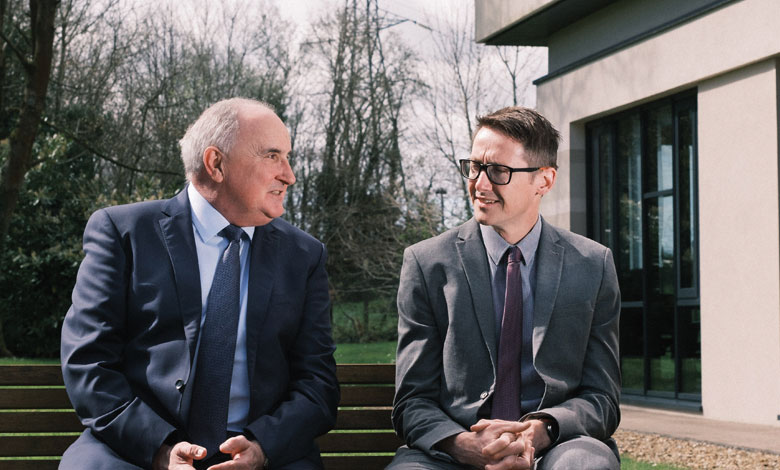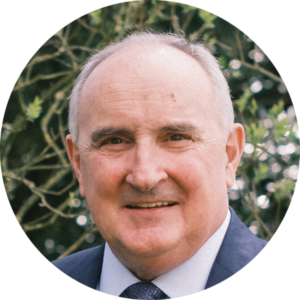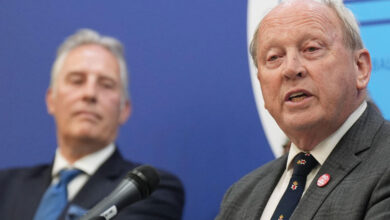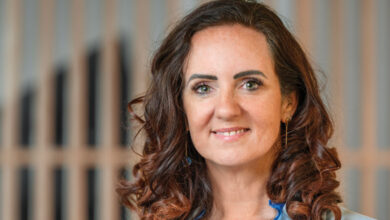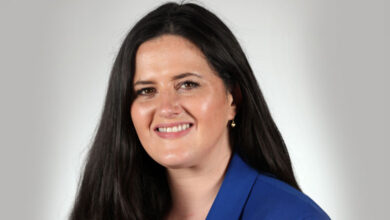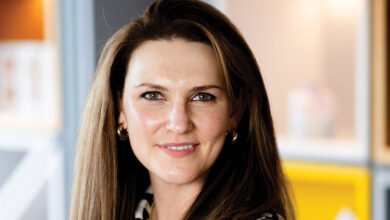Accelerating to net zero
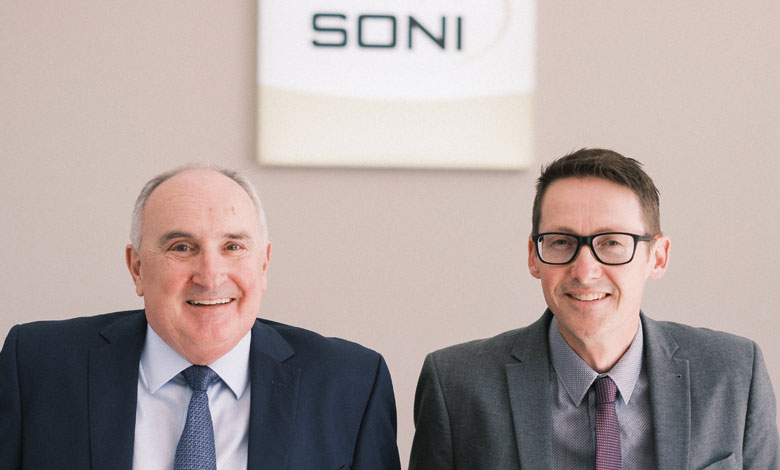
Chief Executive of the System Operator Northern Ireland (SONI), Alan Campbell, is joined by Chair of the newly appointed independent board, Peter McNaney, to discuss the importance of plan-led acceleration of a net zero electricity system.
In 2021, Northern Ireland reached a major milestone by becoming among the first power systems in the world to enable up to three-quarters of the electricity on the grid at any one time to come from variable renewable sources.
Credit for the engineering feat, which has served as an exemplar for neighbouring and global power systems, lies with the System Operator Northern Ireland (SONI), and should be viewed in the context of major challenges posed to the safe, secure, and constant flow of electricity in the region.
SONI is responsible for balancing consumer demand with generation to ensure a constant supply of power in Northern Ireland, but also takes the lead on planning for Northern Ireland’s future energy needs by developing projects to upgrade and enhance the high-voltage electricity grid.
As SONI’s Chief Executive Alan Campbell explains, there is no room for SONI to rest on its laurels, with less than six years left to meet the ambitious target set by the Climate Change (Northern Ireland) Act 2022 of 80 per cent of electricity consumption coming from renewables by 2030.
“If Northern Ireland is to meet ambitious targets of the integration and use of significantly more renewable energy, the electricity grid, and how the system is operated, has to be upgraded in an unprecedented manner,” he states.
Recently, SONI published an update to Shaping Our Electricity Future, its long-term roadmap to balance increasing power demand with ambitious climate change policies.
Explaining the fundamental vision for the roadmap, Campbell says: “To achieve these targets by 2030, more energy from renewable sources needs to be connected to the power system. This means that the electricity grid will need to carry more power from energy sources that vary depending on the weather. This power will also need to be carried over longer distances. As a result, we need to make the grid stronger and more flexible.”
The appointment of a new independent board to SONI towards the end of 2023 marked a significant change in the governance and operations of the Transmission System Operator (TSO).
The operation and governance changes come at a critical time for the TSO, as it seeks to be an enabler of a net zero electricity grid in Northern Ireland.
The establishment of the board is one of a suite of changes being driven by the Utility Regulator’s license modifications to SONI, which has mandated greater managerial and operational independence from its parent company, EirGrid plc.
“SONI’s direct cost to the consumer is on average only around 2 per cent of their electricity bill, however, our influence on the whole cost to electricity consumers is much more significant.”
SONI’s Chief Executive Alan Campbell
As well as transitioning from Managing Director of SONI to its new Chief Executive, Campbell also sits on the new board chaired by McNaney along with four other independent members, all of whom are geared towards meeting the challenges and harvesting the opportunities that exist in the creation of a fully integrated and decarbonised power system.
Discussing the implementation of the board, Campbell says: “At this crucial time in the energy transition, our team looks forward to working with the new board members, who each bring considerable expertise and experience, to drive forward our mission to deliver a cleaner energy future for everyone in Northern Ireland.”
Describing his attraction to take up the position as SONI Chair, the experienced Peter McNaney, a former chief executive of Belfast City Council and chair of the Belfast Health and Social Care Trust, explains that SONI has the foresight, opportunity, and talent to make a lasting change to the region.
“In the coming years, delivering the challenging ambitions set by the Northern Ireland energy strategy and Climate Change Act is going to require a step change in the intensity of ideas, collaboration, and delivery within the energy industry and beyond.
“Along with the other new members of the board, I look forward to working with the team in SONI to deliver its vision for the future and ensuring it can thrive as a successful TSO for the benefit of local communities, businesses, and farms across Northern Ireland.”
Campbell echoes McNaney’s sentiments that the largest upgrade to the electricity system since electrification itself is a defining topic of our age and welcomes the “fresh perspective and challenge”.
“While Northern Ireland’s 2030 renewable energy targets are very ambitious and challenging, the social, economic, and environmental opportunities afforded by this once-in-a-generation transition are huge,” he adds.
SONI and its board retain a close collaboration with their parent company EirGrid, however, the change has enabled a restructuring of SONI’s leadership in Belfast, including plans to recruit four new directors. Additionally, the board has set about an engagement process with key stakeholders in the electricity system, not least the Utility Regulator and the Northern Ireland Executive.
SONI’s future vision for the electricity grid is being delivered in the context of challenging short-term delivery conditions. The Winter Outlook, published at the end of 2023, showed that SONI was cautiously optimistic that there would be sufficient electricity generation to meet expected demand in normal operating conditions.
However, the complexity of balancing supply and demand on a daily basis was evident in a warning that risk of supply had increased due to the “tightening of electricity buffer margins”. A similar theme was evident in SONI’s Ten-Year Generation Capacity Statement 2023-2032, an annual all-island study that sets out the likely balance between electricity supply and anticipated demand over the next 10 years, which pointed to challenges ahead.
The analysis was a clear signal to the electricity market that investment in new generation and the subsequent timely delivery of secured contracts will be required to ensure a stable and secure supply of electricity for consumers in both Northern Ireland and the Republic of Ireland. As the System Operator, SONI relies on the market to deliver the required generation to plan the system to meet Northern Ireland’s energy needs.
Campbell is quick to point out that the short-term challenges associated with maintaining supply while also undergoing a significant modernisation process is not unique to Northern Ireland, but adds that SONI and all relevant stakeholders must work together to manage the reliable supply of electricity,
Acknowledging the scale of the challenge, McNaney says that evidence to date indicates that SONI is well-placed to meet the needs of the region.
“SONI’s Shaping our Electricity Future Roadmap, in its original form, predated the release of the Energy Strategy and the Climate Change Act and it is telling that the ambition already existed to reach those high 70 to 80 per cent renewable electricity targets.
“SONI is well placed to support the energy transition because the foresight enabled by their research and evidence-base means that the organisations are already turned in that direction. Their direction of travel is clear, concise, and well-documented, something that was very appealing to me when I applied for the post of chair.”
SONI’s Tomorrow’s Energy Scenarios research programme explores a number of likely scenarios to understand how much electricity we might need and how it can be provided, beyond 2030, up to 2050.
As Campbell explains, SONI’s scenario planning and forecasting is a critical part of its role as an independent and trusted advisor to government energy policy, ensuring that decision-makers are best informed on the potential long-term implications of policy decisions.
This collaboration with decision-makers and key energy market stakeholders is something that must be fostered if Northern Ireland is to maximise the opportunities of a transition to a net zero future. Outlining that currently SONI must approach connections to the grid and plans to increase grid capacity reactively, in response to demand for developers, Campbell believes this approach to be inefficient and contributory to increased costs and timescales.
Instead, he has called for a shift to a more plan-led approach in collaboration with industry, government, and regulatory partners.
“SONI can increase grid capacity in a more strategic, proactive, and timely manner through more anticipatory investment while reducing costs and timescales for grid connections,” he explains.
Such collaboration is a crucial part of SONI’s forthcoming Transmission Development Plan for Northern Ireland (TDPNI), a 10-year roadmap for the strategic development of the electricity transmission network, for which consultation closed at the end of 2023.
McNaney explains that the Transmission Development Plan will also be critical to the delivery of SONI’s next price control submission out to 2030, work on which is already being undertaken.
However, SONI’s Chief Executive is insistent that transformational plans for the future grid must also acknowledge the short-term challenges of managing a power system in transition, highlighting that SONI’s priority must be to maintain security of supply of electricity for consumers. To this end, he welcomes the forthcoming delivery of a new renewable energy support scheme to increase renewable generation but stresses the importance of the appropriate market incentive mechanisms to ensure the “right generation is delivered in the right place at the right time”.
“SONI’s direct cost to the consumer is on average only around 2 per cent of their electricity bill, however, our influence on the whole cost to electricity consumers is much more significant. That is why it is so important that we strike the correct balance between increasing the levels of renewable electricity on the grid to meet demand but doing it in the most cost-effective way which does not threaten security of supply.”
McNaney highlights that in recognition of the role SONI has in providing this balance, the grid operator launched a fundamental review of its engagement strategy in February 2024, with the aim of improving how it engages with local communities, businesses, landowners, and the energy industry, as it seeks to make fundamental changes to the electricity grid.
Technology solutions
Greater levels of renewables on the system also means greater levels of intermittence, and a geographic realignment of where generation must be transported from, if Northern Ireland is to transition away from on fossil fuel power plants. Campbell describes it as “vitally important” that the second North South Interconnector is built, to provide greater stability through the Single Electricity Market (SEM).
He indicates Northern Ireland’s planning system as a potential barrier regarding the need to double the amount of renewable generation connected to the grid by 2030 and questions the deliverability of a total overhaul of the planning system given the pressing timescales.
“Ultimately, the planning system needs to be appropriately resourced to meet the level of demand being placed on it, and the increased demand set to come forward. If planning authorities are going to deliver on tight timelines, then they must have the adequate resources to do so. I believe having that overarching plan-led approach to renewable development and grid expansion will be beneficial to allowing those authorities to prioritise.”
Alongside greater levels of interconnection, SONI is also engaged in several programmes of service development, integrating technologies that will help maintain stable supply. Four large battery sites in Northern Ireland have already been connected to the grid, and in October 2023, SONI published a call for evidence on the market procurement options for long duration energy storage.
McNaney illustrates that as well as managing and deploying those on-grid services, SONI also has a role in helping to shape behavioural change in relation to energy use and how consumers engage with the electricity grid.
“As we look to electrification as the primary driver of decarbonisation, there is a widespread recognition that keeping the same societal behaviours will result in higher and frankly unsustainable demand for renewable electricity. We need a smarter approach to our electricity use, so that we can minimise the amount of additional infrastructure required and the technology that will need to be deployed.
“The Department for the Economy is set to develop a plan for the implementation of electricity smart meters and systems, and this is a welcome step to encourage and incentivise households to engage with and help manage the electricity grid.”
He continues: “As a board, we are very mindful of the need to ensure the energy transition is affordable to the consumer but we are also keen to ensure that the actions being taken to reach the ambitious decarbonisation targets are being done with consumers, and not to consumers.
“SONI’s track record of community engagement to date is well documented and has been successful, but as we move faster and further it is important that we build on those relationships and bring people along on the journey.
Concluding, Campbell says: “While Northern Ireland’s 2030 renewable energy targets are very ambitious and challenging, we know collectively what we need to do and we have a plan. The key challenge is time, and now is the moment to rise to that challenge.
“As an organisation, SONI is geared to help maximise those opportunities and our people are driven by potential to make lasting change to through world-leading engineering solutions and to benefit the consumer.
“The substantive policy direction and the required measures to deliver Northern Ireland’s renewable energy targets are largely in place. The key focus now needs to be on removing the barriers which risk falling short and proactively identifying opportunities to accelerate delivery. As Northern Ireland’s Transmission System Operator, SONI is committed to working collaboratively to meet this challenge.”
McNaney adds: “There is nothing I have seen in the past six months that causes me any concern about the ability of this organisation to rise and meet the challenges ahead, driven by the right values. As we stand at a historical point in time, SONI is well placed to ensure Northern Ireland, through its expertise in technology and engineering, can realise the opportunities and potential of this energy transition.”

